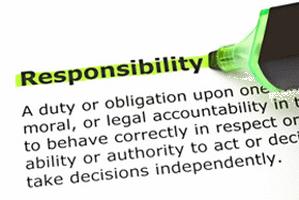(Duties and Responsibilities)
SMSF Trustee obligations can be onerous. If they are attended diligently there shouldn’t be any adverse issues for the trustees. On the flip side of that, the attention of the Regulator may be an unwelcome event.
As an SMSF trustee, you are ultimately responsible for running your self managed super fund. It is important you understand the duties, responsibilities and obligations of the role of trustee.

In this capacity, you need to act according to the following:
- your fund’s trust deed – make certain that you have read it: and that you understand it;
- the provisions of the super laws, including –
- Superannuation Industry (Supervision) Act 1993 (SISA) –
- Superannuation Industry (Supervision) Regulations 1994 (SISR) –
- you may want to seek guidance from a professional advisor and Regulator websites on these matters;
- the Income Tax Assessment Act 1997 (ITAA 1997). You will almost certainly engage a professional advisor in this regard : as you will for the next item as well;
- the Tax Administration Act 1953 (TAA 1953) – see previous item;
- the Corporations Act 2001. You will almost certainly engage a professional advisor in this regard : as you will for the next item as well;
- other general rules, such as those imposed under other tax and trust laws. See previous item.
Your responsibilities embrace ensuring that the fund is properly administered so as to be compliant with all relevant founding documents, legislation and regulations (for some detail as to the administration role, see our article ‘SMSF Superannuation Administration matters‘).
If there is a conflict between the super laws and the trust deed, the law overrides the trust deed. If you fail to perform your duties according to the laws, you may face penalties.
Formally sign on as Trustee
Your SMSF Trustee obligations commence from when you accept that role. If you are a new trustee or newly appointed director of corporate trustees, you need to sign the Trustee declaration within 21 days of your appointment to show that you understand your duties and responsibilities as a trustee of an SMSF.
Remember, the purpose of setting up your SMSF is to provide for your retirement. It is illegal to set up an SMSF to gain early access to your funds. If benefits are unlawfully released, significant penalties including fines and jail terms of up to five years can apply to you, your fund and the recipient of the early release.
Understand the rules
The rules you need to follow as a trustee of an SMSF, include the following:
- you need to act honestly in all matters concerning your fund
- you need to exercise skill and diligence in managing your fund
- you need to act in the best interest of all members
- keep the money and assets of your fund separate from other money and assets (for example, your personal assets)
- retain control over your fund
- develop and implement an investment strategy (including life insurance offerings)
- you can’t enter into contracts or behave in a way that hinders you or other trustees from performing or exercising functions or powers
- allow members access to certain information
- you can’t access or allow others to access funds early.
The SIS Act contains rules that impose minimum requirements on trustees and are deemed to be included in the trust deed of every regulated fund. These reflect the duties imposed on all trustees under trust law in general. There can be severe ramifications for an SMSF trustee who does not participate in the role, relying on co-trustees to ‘get it right’.
Getting guidance and advice
You can appoint other people to help you or provide services to your fund (for example, an accountant, super fund administrator, tax agent or financial planner). However, the SMSF Trustee obligations ultimately lie with you: you have the responsibility and accountability for running the fund in a compliant, prudent, and honest manner.
Money belonging to your SMSF can’t be used for personal or business purposes under any circumstances. The SMSF’s assets are not a form of credit or emergency fund when faced with a sudden need and should never be used as such as the penalties applicable can be severe.
If you don’t follow the rules, you risk one or more of the following:
- your SMSF being deemed non-compliant and losing its tax concessions
- getting disqualified as a trustee
- prosecution
- penalties.
If you fail to act according to the trust deed, other members of your fund may take legal action against you.
SMSF Trustee Obligations and ContinuumFP
Continuum Financial Planners Pty Ltd does not provide superannuation fund administration services: however, we offer a range of services in the field of superannuation strategy and investment; and we have associations with providers of administration services. To make an appointment with one of our team to explore how we can simplify your satisfying SMSF Trustee obligations –
- phone our office, on 07-34213456, or
- at your convcenience, use the linked Book A Meeting facility.
(This article was originally posted by us in August 2009. We occasionally update/ refresh it, most recently in March 2025.)


